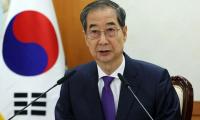No record of ruling elite’s tax history with FBR
ISLAMABAD: A journalist spoke to a senior officer of Federal Board of Revenue inquiring about the FBR archive, if any maintained.The intended objective was to scan through the record to find out the tax history of the high and mighty who ruled Pakistan, making it dependent on foreign dollars instead
By Umar Cheema
November 04, 2015
ISLAMABAD: A journalist spoke to a senior officer of Federal Board of Revenue inquiring about the FBR archive, if any maintained.
The intended objective was to scan through the record to find out the tax history of the high and mighty who ruled Pakistan, making it dependent on foreign dollars instead of collecting enough revenue to run the government.
The officer checked with the FBR library housed in a kitchen-size room at the headquarters, only to tell back in negative. Then he rang to the director general of Training and Research in Lahore to ask the same question.
Instead of disappointing straightforward, the DG told the concerned officer to ask the journalist to speak and apprise her of his demand who did accordingly. Unaware of the record maintained in the directorate, the lady officer promised to respond after checking with the subordinate staff. It took her a couple of months before replying in negative. She said that FBR formations in different cities must be having such record.
This is a bizarre reflection on the sorry tax affairs in a country where decision-makers hate to chronicle the history, lest they have to learn any lesson from it.
There is no literature available on the tax history of Pakistan and that how compliant were the rulers who instead of collecting taxes from the rich, introduced regressive regime of indirect taxation to milk the middle class and the poor.
Pakistan is 68-year old and has since been depending on foreign loan and aid to run its affairs. More than five tax reforms commissions have been constituted to submit recommendations for increasing the tax-to-GDP ratio that has failed to cross the psychological barrier of 10 percent with an exception of couple of years.
These commissions have failed to arrest the commission of tax crimes. If the history is any guide, no amount of recommendation will result in revenue increase unless tax payment becomes part of our value system.
The leaders have a great role to play in it; not by urging the masses to pay taxes but through purging tax evaders from their ranks and files.
Imagine that people of Pakistan have access to the tax returns of the leaders who had ruled and who are ruling. No Pakistani is aware of their tax practices. Compare this with the American leadership. Anybody anywhere in the world can even check the tax returns of Franklin Roosevelt who presided America in early 20th century.
The presidential library named after Roosevelt has made available his returns from 1913 to 1937. So is the case of Harry S Truman. One can even read tax history of Abraham Lincoln.
As in Pakistan, tax return is legally protected information in America, however, those aspiring to lead or succeeded in getting leadership not only make their tax record public but also of their spouses considering it public right to know about their income sources and tax paid by them.
From Richard Nixon onward, it has become a tradition to make tax returns public. Mitt Romney who failed in presidential bid in 2012 had to face intense criticism when showed reluctance to make tax record public beyond three years.
There is no country perfect by all means but there is no harm in borrowing good examples set at other places. The best way to fight tax evasion is to make it public.
Hardly any leader appearing on TV screen will admit committing a tax crime. They have no dearth of excuses if found lying through teeth. Democracy is the first and last refuge for them as any act of exposing them is tantamount to discrediting democracy.
This correspondent faced such allegations when unmasked the tax evasion by the lawmakers in 2012. Although no lawmaker was held on account of malpractices, this information exposed public to the real faces of the rulers.
A letter from the then tax ombudsman, Dr Shoaib Suddle, fell on the deaf ear of the Election Commission of Pakistan. The letter demanded a fresh oath wherein the lawmakers have to declare paying honest tax payment.
Imagine if Pakistan’s tax history is taught at school and college level.Some role models deserve attention of the masses that will set criteria for them to measure the patriotism of a leader by the level of honest tax payment.
The founding leaders like Quaid-i-Azam, Allama Muhammad Iqbal and Fatima Jinnah had set good examples of tax compliance not knowing that Pakistanis will remain ignorant about that.
The present government deserves credit for making tax public by issuing directories of the lawmakers and citizens filing tax returns. It is a great step forward as Pakistan is the fourth country having done so after Norway, Sweden and Finland but a lot remains to be done. The information given in the directory doesn’t include the income declared by a filer and the nature of earning as is the case in the above-referred three countries.
Not only the income declarations be made part of tax information in the directory, the government must use diplomatic channels for acquiring the tax record of Quaid-i-Azam from India. Likewise, Allama Iqbal’s record can be obtained from the record at Lahore office and Fatima Jinnah’s from Karachi.
Likewise, the tax returns of the leaders who have been at the helm of affairs right after Quaid-i-Azam till to-date must also be made public. Although the information will contain surprises, mostly unpleasant, there will be a strong message for the rulers of future that non-compliance of tax laws will be the biggest hurdle in way of their pursuit of power.
Will Prime Minister Nawaz Sharif and his Finance Minister Ishaq Dar dare to take this extraordinary step? Doing so will give them a unique position in the history and reinvigorate their campaign against tax evaders. Else, they should stop blaming the masses for not paying the taxes. Like leaders, like led.
The intended objective was to scan through the record to find out the tax history of the high and mighty who ruled Pakistan, making it dependent on foreign dollars instead of collecting enough revenue to run the government.
The officer checked with the FBR library housed in a kitchen-size room at the headquarters, only to tell back in negative. Then he rang to the director general of Training and Research in Lahore to ask the same question.
Instead of disappointing straightforward, the DG told the concerned officer to ask the journalist to speak and apprise her of his demand who did accordingly. Unaware of the record maintained in the directorate, the lady officer promised to respond after checking with the subordinate staff. It took her a couple of months before replying in negative. She said that FBR formations in different cities must be having such record.
This is a bizarre reflection on the sorry tax affairs in a country where decision-makers hate to chronicle the history, lest they have to learn any lesson from it.
There is no literature available on the tax history of Pakistan and that how compliant were the rulers who instead of collecting taxes from the rich, introduced regressive regime of indirect taxation to milk the middle class and the poor.
Pakistan is 68-year old and has since been depending on foreign loan and aid to run its affairs. More than five tax reforms commissions have been constituted to submit recommendations for increasing the tax-to-GDP ratio that has failed to cross the psychological barrier of 10 percent with an exception of couple of years.
These commissions have failed to arrest the commission of tax crimes. If the history is any guide, no amount of recommendation will result in revenue increase unless tax payment becomes part of our value system.
The leaders have a great role to play in it; not by urging the masses to pay taxes but through purging tax evaders from their ranks and files.
Imagine that people of Pakistan have access to the tax returns of the leaders who had ruled and who are ruling. No Pakistani is aware of their tax practices. Compare this with the American leadership. Anybody anywhere in the world can even check the tax returns of Franklin Roosevelt who presided America in early 20th century.
The presidential library named after Roosevelt has made available his returns from 1913 to 1937. So is the case of Harry S Truman. One can even read tax history of Abraham Lincoln.
As in Pakistan, tax return is legally protected information in America, however, those aspiring to lead or succeeded in getting leadership not only make their tax record public but also of their spouses considering it public right to know about their income sources and tax paid by them.
From Richard Nixon onward, it has become a tradition to make tax returns public. Mitt Romney who failed in presidential bid in 2012 had to face intense criticism when showed reluctance to make tax record public beyond three years.
There is no country perfect by all means but there is no harm in borrowing good examples set at other places. The best way to fight tax evasion is to make it public.
Hardly any leader appearing on TV screen will admit committing a tax crime. They have no dearth of excuses if found lying through teeth. Democracy is the first and last refuge for them as any act of exposing them is tantamount to discrediting democracy.
This correspondent faced such allegations when unmasked the tax evasion by the lawmakers in 2012. Although no lawmaker was held on account of malpractices, this information exposed public to the real faces of the rulers.
A letter from the then tax ombudsman, Dr Shoaib Suddle, fell on the deaf ear of the Election Commission of Pakistan. The letter demanded a fresh oath wherein the lawmakers have to declare paying honest tax payment.
Imagine if Pakistan’s tax history is taught at school and college level.Some role models deserve attention of the masses that will set criteria for them to measure the patriotism of a leader by the level of honest tax payment.
The founding leaders like Quaid-i-Azam, Allama Muhammad Iqbal and Fatima Jinnah had set good examples of tax compliance not knowing that Pakistanis will remain ignorant about that.
The present government deserves credit for making tax public by issuing directories of the lawmakers and citizens filing tax returns. It is a great step forward as Pakistan is the fourth country having done so after Norway, Sweden and Finland but a lot remains to be done. The information given in the directory doesn’t include the income declared by a filer and the nature of earning as is the case in the above-referred three countries.
Not only the income declarations be made part of tax information in the directory, the government must use diplomatic channels for acquiring the tax record of Quaid-i-Azam from India. Likewise, Allama Iqbal’s record can be obtained from the record at Lahore office and Fatima Jinnah’s from Karachi.
Likewise, the tax returns of the leaders who have been at the helm of affairs right after Quaid-i-Azam till to-date must also be made public. Although the information will contain surprises, mostly unpleasant, there will be a strong message for the rulers of future that non-compliance of tax laws will be the biggest hurdle in way of their pursuit of power.
Will Prime Minister Nawaz Sharif and his Finance Minister Ishaq Dar dare to take this extraordinary step? Doing so will give them a unique position in the history and reinvigorate their campaign against tax evaders. Else, they should stop blaming the masses for not paying the taxes. Like leaders, like led.
-
 How Your Body 'suffers' In Back Pain And Simple Way To Fix It
How Your Body 'suffers' In Back Pain And Simple Way To Fix It -
 What Victoria Beckham Really Did At Brooklyn, Nicola’s Wedding Revealed
What Victoria Beckham Really Did At Brooklyn, Nicola’s Wedding Revealed -
 Send Your Name To Moon With Nasa’s Artemis Mission: Here’s How
Send Your Name To Moon With Nasa’s Artemis Mission: Here’s How -
 Zhipu AI, MiniMax Debuts Mask Structural Hurdles For China’s Tech Giants
Zhipu AI, MiniMax Debuts Mask Structural Hurdles For China’s Tech Giants -
 ‘Stargate Community’: Inside OpenAI’s Plan To Cut AI Data Center Energy Costs
‘Stargate Community’: Inside OpenAI’s Plan To Cut AI Data Center Energy Costs -
 Could Brooklyn Beckham Drop His Surname Following Family Feud?
Could Brooklyn Beckham Drop His Surname Following Family Feud? -
 Rachel McAdams Becomes Object Of Jokes At Hollywood Star Of Fame Event
Rachel McAdams Becomes Object Of Jokes At Hollywood Star Of Fame Event -
 South Korea's Ex-PM Han Duck-soo Jailed For 23 Years Over Martial Law Crises
South Korea's Ex-PM Han Duck-soo Jailed For 23 Years Over Martial Law Crises -
 Global Markets On Edge Over Greenland Dispute: Is US Economic Leadership At Risk?
Global Markets On Edge Over Greenland Dispute: Is US Economic Leadership At Risk? -
 King, Queen Visit Deadly Train Crash Site
King, Queen Visit Deadly Train Crash Site -
 Oxford Research Warns ChatGPT Reflects Western Worldviews
Oxford Research Warns ChatGPT Reflects Western Worldviews -
 UK Inflation Unexpectedly Rises To 3.4% In December, The First Increase In Five Months
UK Inflation Unexpectedly Rises To 3.4% In December, The First Increase In Five Months -
 Meghan Markle Set To Take Big Decision On Returning To UK For Invictus Games
Meghan Markle Set To Take Big Decision On Returning To UK For Invictus Games -
 Prince Harry To Leave Britain One Day Earlier Than Expected For THIS Reason
Prince Harry To Leave Britain One Day Earlier Than Expected For THIS Reason -
 The Way You Consume Sugar Could Be Affecting Your Health
The Way You Consume Sugar Could Be Affecting Your Health -
 Brooklyn Beckham Gets Backing From Vanessa Marcil Amid Feud With Parents
Brooklyn Beckham Gets Backing From Vanessa Marcil Amid Feud With Parents



